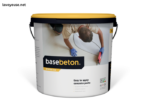In the construction industry, the choice of materials can significantly influence the durability, safety, and overall quality of structures. Among these materials, Base Beton 12 stands out due to its unique properties and versatility. This specific type of concrete is increasingly being utilized in various construction applications, offering robust solutions for both residential and commercial projects.
Base Beton 12 is characterized by its excellent compressive strength, durability, and adaptability, making it a preferred choice for many builders and engineers. Understanding the features, benefits, and applications of Base Beton 12 can provide invaluable insights for construction professionals and DIY enthusiasts alike.
As we delve deeper into this topic, we will explore the fundamental aspects of Base Beton 12, its composition, applications, advantages, and considerations for its use. By the end of this comprehensive guide, you will have a thorough understanding of why Base Beton 12 is a critical component in modern construction practices.
What is Base Beton 12?
Base Beton 12 refers to a specific grade of concrete that is formulated to achieve a particular set of characteristics ideal for construction purposes. The term “Beton” is derived from French, meaning concrete, and “Base” indicates that this is a foundational type of concrete often used in the early stages of construction.
Typically, Base Beton 12 contains a mix of cement, aggregates, water, and various additives that enhance its properties. The number “12” usually denotes the minimum compressive strength measured in megapascals (MPa) that this concrete can achieve after a standard curing period, often 28 days. In practical terms, Base Beton 12 is designed to withstand significant loads, making it suitable for structural applications.
Key Characteristics of Base Beton 12
- Compressive Strength: The primary feature of Base Beton 12 is its compressive strength, which is critical for structural integrity. It generally achieves a compressive strength of 12 MPa or higher, depending on the mix and curing conditions.
- Durability: This concrete type is formulated to resist various environmental factors, such as moisture, temperature fluctuations, and chemical exposure, making it suitable for both indoor and outdoor applications.
- Workability: Base Beton 12 is designed to be easily mixed and placed, allowing for smooth application during construction projects.
- Versatility: Due to its properties, Base Beton 12 can be used in a wide range of applications, from foundations to pavements and precast elements.
How is Base Beton 12 Made?
The production of Base Beton 12 involves a careful balance of ingredients to achieve the desired properties. The standard process includes the following steps:
- Cement Selection: High-quality Portland cement is typically used as the binder in Base Beton 12. The choice of cement can influence the final strength and durability of the concrete.
- Aggregate Selection: Aggregates, which can be coarse (gravel or crushed stone) and fine (sand), make up a significant portion of the concrete mix. The size and type of aggregates affect the workability and strength of the concrete.
- Water-Cement Ratio: The ratio of water to cement is critical in determining the strength and durability of Base Beton 12. A lower water-cement ratio generally results in higher strength but can reduce workability.
- Additives: Various additives may be included to enhance specific properties, such as improving setting time, increasing strength, or enhancing durability against environmental factors.
- Mixing and Curing: The ingredients are thoroughly mixed to ensure uniformity, followed by proper curing to achieve the desired strength and durability.
The Importance of Quality Control
Quality control is essential during the production of Base Beton 12. This involves regular testing of the concrete mix for consistency, strength, and performance characteristics. Ensuring that the concrete meets specified standards is vital for maintaining structural integrity and safety.
What Are the Applications of Base Beton 12?
Base Beton 12 is utilized in a wide variety of construction applications, each taking advantage of its specific properties. Some common uses include:
- Foundations: One of the primary applications of Base Beton 12 is in constructing building foundations. Its strength and durability make it ideal for supporting the weight of structures.
- Pavements and Walkways: Due to its ability to withstand traffic loads and environmental factors, Base Beton 12 is often used for driveways, sidewalks, and other paved surfaces.
- Precast Concrete Elements: Many precast concrete products, such as beams, slabs, and blocks, are made using Base Beton 12. Its workability allows for intricate designs and consistent quality in precast components.
- Retaining Walls: The structural integrity of Base Beton 12 makes it suitable for constructing retaining walls that need to hold back soil and withstand lateral pressure.
- Infrastructure Projects: Various infrastructure projects, such as bridges and tunnels, utilize Base Beton 12 for its load-bearing capabilities and resistance to environmental conditions.
Examples of Base Beton 12 in Action
Consider a residential construction project where Base Beton 12 is used for the foundation. The concrete is mixed on-site, poured into forms, and allowed to cure for a specified period. Once cured, it provides a strong and stable base for the entire structure.
Similarly, in road construction, Base Beton 12 is laid as a base layer before applying asphalt or other surface materials. Its strength helps distribute loads evenly, preventing cracks and surface degradation.
What Are the Advantages of Using Base Beton 12?
The use of Base Beton 12 offers numerous advantages in construction, making it a popular choice among builders and engineers. Some key benefits include:
- High Strength: With a minimum compressive strength of 12 MPa, Base Beton 12 provides excellent load-bearing capacity, essential for structural applications.
- Durability: This concrete type is formulated to withstand various environmental conditions, making it suitable for both indoor and outdoor use.
- Cost-Effectiveness: The efficiency of Base Beton 12 in construction can lead to cost savings by reducing the need for additional materials or repairs.
- Ease of Use: Its workability allows for easy mixing, pouring, and finishing, which can accelerate construction timelines.
- Versatility: Base Beton 12 can be tailored for various applications, making it a flexible choice for different projects.
A Case Study: Cost Savings with Base Beton 12
A recent project involving a commercial building highlighted the cost-effectiveness of using Base Beton 12. By opting for this concrete type, the construction team was able to streamline the foundation process, resulting in reduced labor costs and a quicker timeline. The durability of Base Beton 12 also minimized the need for future maintenance, further enhancing the project’s financial efficiency.
What Are the Considerations When Using Base Beton 12?
While Base Beton 12 offers numerous benefits, there are also considerations to keep in mind when using this concrete type. These include:
- Environmental Conditions: The performance of Base Beton 12 can be influenced by temperature and humidity during curing. Proper measures should be taken to ensure optimal curing conditions.
- Mix Design: Achieving the right mix design is crucial for ensuring the desired strength and workability. Variations in materials or ratios can significantly impact the final product.
- Regulatory Compliance: Construction projects must adhere to local building codes and standards. Ensuring that Base Beton 12 meets these requirements is essential for project approval.
- Long-Term Performance: While Base Beton 12 is durable, it’s important to consider long-term performance factors, such as exposure to chemicals or extreme weather conditions.
Best Practices for Utilizing Base Beton 12
To maximize the benefits of Base Beton 12, construction professionals should implement best practices, such as:
- Conducting thorough testing of materials before mixing.
- Monitoring environmental conditions during curing.
- Following established guidelines for mix design and application.
How Does Base Beton 12 Compare to Other Concrete Types?
When selecting concrete for a project, it’s essential to understand how Base Beton 12 compares to other types. Here are a few comparisons:
- Base Beton 12 vs. Standard Concrete: While standard concrete may offer general applicability, Base Beton 12 is specifically formulated to achieve higher strength and durability, making it more suitable for structural applications.
- Base Beton 12 vs. High-Performance Concrete: High-performance concrete typically offers even greater strength and specialized properties. However, Base Beton 12 provides a cost-effective option for many standard construction needs.
- Base Beton 12 vs. Lightweight Concrete: Lightweight concrete is used for applications requiring reduced weight. In contrast, Base Beton 12 is favored for its strength and durability in load-bearing scenarios.
Choosing the Right Concrete Type
When selecting the appropriate concrete type for a project, it is crucial to consider factors such as load requirements, environmental conditions, and budget constraints. Understanding the differences between Base Beton 12 and other options can help professionals make informed decisions.
What Are the Future Trends in Concrete Technology?
As the construction industry evolves, several trends may influence the development and use of concrete types like Base Beton 12. These trends include:
- Sustainable Practices: Increasing emphasis on sustainability is driving the development of eco-friendly concrete alternatives. Innovations in recycling materials and reducing carbon footprints will likely shape future formulations.
- Smart Concrete: The integration of technology into concrete formulations is emerging. Smart concrete can monitor its own condition, providing real-time data on strength and durability.
- 3D Printing: Advances in 3D printing technology may change how concrete is used in construction. This could allow for more complex designs and efficient material usage.
- Enhanced Performance: Research into additives and new mixing techniques will continue to improve the performance characteristics of concrete types, including Base Beton 12.
Staying Ahead of Industry Changes
For construction professionals, staying informed about emerging trends and technologies will be essential for maintaining competitiveness and ensuring the successful application of materials like Base Beton 12.
Conclusion
In conclusion, Base Beton 12 plays a vital role in the construction industry due to its strength, durability, and versatility. Understanding its properties, applications, and advantages is essential for construction professionals looking to optimize their projects. By considering factors such as mix design, environmental conditions, and emerging trends, builders can harness the full potential of Base Beton 12 for both residential and commercial applications.
As the industry continues to evolve, the importance of Base Beton 12 as a foundational material will remain significant. By staying updated on innovations and best practices, professionals can ensure they are utilizing this essential concrete type effectively, contributing to the overall success of their construction endeavors.


